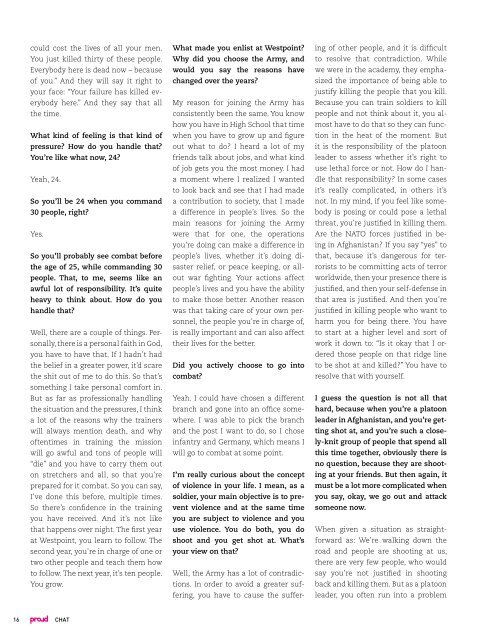proUd pArty 3 yEArS AnnivErSAry 30GUyS with GUnS chAt with An ...
proUd pArty 3 yEArS AnnivErSAry 30GUyS with GUnS chAt with An ...
proUd pArty 3 yEArS AnnivErSAry 30GUyS with GUnS chAt with An ...
Sie wollen auch ein ePaper? Erhöhen Sie die Reichweite Ihrer Titel.
YUMPU macht aus Druck-PDFs automatisch weboptimierte ePaper, die Google liebt.
could cost the lives of all your men.<br />
You just killed thirty of these people.<br />
Everybody here is dead now – because<br />
of you.” <strong>An</strong>d they will say it right to<br />
your face: “Your failure has killed everybody<br />
here.” <strong>An</strong>d they say that all<br />
the time.<br />
What kind of feeling is that kind of<br />
pressure How do you handle that<br />
You’re like what now, 24<br />
Yeah, 24.<br />
So you’ll be 24 when you command<br />
30 people, right<br />
Yes.<br />
So you’ll probably see combat before<br />
the age of 25, while commanding 30<br />
people. That, to me, seems like an<br />
awful lot of responsibility. It’s quite<br />
heavy to think about. How do you<br />
handle that<br />
Well, there are a couple of things. Personally,<br />
there is a personal faith in God,<br />
you have to have that. If I hadn’t had<br />
the belief in a greater power, it’d scare<br />
the shit out of me to do this. So that’s<br />
something I take personal comfort in.<br />
But as far as professionally handling<br />
the situation and the pressures, I think<br />
a lot of the reasons why the trainers<br />
will always mention death, and why<br />
oftentimes in training the mission<br />
will go awful and tons of people will<br />
“die” and you have to carry them out<br />
on stretchers and all, so that you’re<br />
prepared for it combat. So you can say,<br />
I’ve done this before, multiple times.<br />
So there’s confidence in the training<br />
you have received. <strong>An</strong>d it’s not like<br />
that happens over night. The first year<br />
at Westpoint, you learn to follow. The<br />
second year, you’re in charge of one or<br />
two other people and teach them how<br />
to follow. The next year, it’s ten people.<br />
You grow.<br />
What made you enlist at Westpoint<br />
Why did you choose the Army, and<br />
would you say the reasons have<br />
changed over the years<br />
My reason for joining the Army has<br />
consistently been the same. You know<br />
how you have in High School that time<br />
when you have to grow up and figure<br />
out what to do I heard a lot of my<br />
friends talk about jobs, and what kind<br />
of job gets you the most money. I had<br />
a moment where I realized I wanted<br />
to look back and see that I had made<br />
a contribution to society, that I made<br />
a difference in people’s lives. So the<br />
main reasons for joining the Army<br />
were that for one, the operations<br />
you’re doing can make a difference in<br />
people’s lives, whether it’s doing disaster<br />
relief, or peace keeping, or allout<br />
war fighting. Your actions affect<br />
people’s lives and you have the ability<br />
to make those better. <strong>An</strong>other reason<br />
was that taking care of your own personnel,<br />
the people you’re in charge of,<br />
is really important and can also affect<br />
their lives for the better.<br />
Did you actively choose to go into<br />
combat<br />
Yeah. I could have chosen a different<br />
branch and gone into an office somewhere.<br />
I was able to pick the branch<br />
and the post I want to do, so I chose<br />
infantry and Germany, which means I<br />
will go to combat at some point.<br />
I’m really curious about the concept<br />
of violence in your life. I mean, as a<br />
soldier, your main objective is to prevent<br />
violence and at the same time<br />
you are subject to violence and you<br />
use violence. You do both, you do<br />
shoot and you get shot at. What’s<br />
your view on that<br />
Well, the Army has a lot of contradictions.<br />
In order to avoid a greater suffering,<br />
you have to cause the suffering<br />
of other people, and it is difficult<br />
to resolve that contradiction. While<br />
we were in the academy, they emphasized<br />
the importance of being able to<br />
justify killing the people that you kill.<br />
Because you can train soldiers to kill<br />
people and not think about it, you almost<br />
have to do that so they can function<br />
in the heat of the moment. But<br />
it is the responsibility of the platoon<br />
leader to assess whether it’s right to<br />
use lethal force or not. How do I handle<br />
that responsibility In some cases<br />
it’s really complicated, in others it’s<br />
not. In my mind, if you feel like somebody<br />
is posing or could pose a lethal<br />
threat, you’re justified in killing them.<br />
Are the NATO forces justified in being<br />
in Afghanistan If you say “yes” to<br />
that, because it’s dangerous for terrorists<br />
to be committing acts of terror<br />
worldwide, then your presence there is<br />
justified, and then your self-defense in<br />
that area is justified. <strong>An</strong>d then you’re<br />
justified in killing people who want to<br />
harm you for being there. You have<br />
to start at a higher level and sort of<br />
work it down to: “Is it okay that I ordered<br />
those people on that ridge line<br />
to be shot at and killed” You have to<br />
resolve that <strong>with</strong> yourself.<br />
I guess the question is not all that<br />
hard, because when you’re a platoon<br />
leader in Afghanistan, and you’re getting<br />
shot at, and you’re such a closely-knit<br />
group of people that spend all<br />
this time together, obviously there is<br />
no question, because they are shooting<br />
at your friends. But then again, it<br />
must be a lot more complicated when<br />
you say, okay, we go out and attack<br />
someone now.<br />
When given a situation as straightforward<br />
as: We’re walking down the<br />
road and people are shooting at us,<br />
there are very few people, who would<br />
say you’re not justified in shooting<br />
back and killing them. But as a platoon<br />
leader, you often run into a problem<br />
like: We capture someone, and you<br />
suspect them to be a terrorist, but you<br />
don’t have the required evidence and<br />
the person is not cooperative, but you<br />
know he has information of a roadside<br />
bomb or something. The natural thing<br />
to do would be to kick the guys ass so<br />
your people don’t die as a result of that<br />
bomb. But as a platoon leader, you are<br />
morally responsible for the situation<br />
and you can’t do that. You have to assess<br />
the situation and you have to turn<br />
the guy over to the appropriate authorities<br />
who will question him properly.<br />
You have to maintain the moral<br />
high ground. If you were to ignore the<br />
rules of warfare and start beating detainees,<br />
that makes you no better than<br />
the terrorists that you’re fighting. If<br />
you go in and kill bad guys, you will<br />
have no regret killing bad guys, but<br />
if you’re killing guys who just act the<br />
same way as you do, then it’s just guys<br />
killing guys, and that’s when people<br />
start having regrets about what they<br />
do in combat.<br />
The soldiers in your platoon, they<br />
tend to be younger than you<br />
Well… both. But that’s really the challenge.<br />
You’ll have a good number of<br />
people in your platoon, you know, 18,<br />
19, 20 years old. They’ll be the lower<br />
level enlisted personnel, you know,<br />
privates and specialists. But then, the<br />
leaders you’re in charge of, the squad<br />
leaders, they will be older than you are<br />
and more experienced in the Army.<br />
<strong>An</strong>d then your platoon sergeant…<br />
What’s a platoon sergeant Is he your<br />
right hand man<br />
Yes, exactly. He’s also responsible for<br />
the platoon, but for different aspects.<br />
It’s up to you and the sergeant to separate<br />
the duties. <strong>An</strong>d this is one of the<br />
most interesting aspects of the Army.<br />
I’ll be a platoon leader at age 24, and<br />
I’ll be the boss of somebody who has<br />
been in the Army for 10, 15 years and<br />
has probably seen three to four deployments<br />
to Iraq and Afghanistan.<br />
Obviously it’s a give and take relationship.<br />
You’d be a fool to go in there and<br />
think you know more than him.<br />
So on the one hand, you get the older,<br />
experienced platoon sergeant, and on<br />
the other hand you get 20 kids at the<br />
age of 18, 19, for the first time away<br />
from home, and you have to lead this<br />
group in a combat environment in<br />
Afghanistan…that’s a nice start for<br />
world travel.<br />
Haha, yes it is.<br />
Lukas Kampfmann<br />
Grafik: Vinzent Britz<br />
16 CHAT<br />
CHAT<br />
17
















